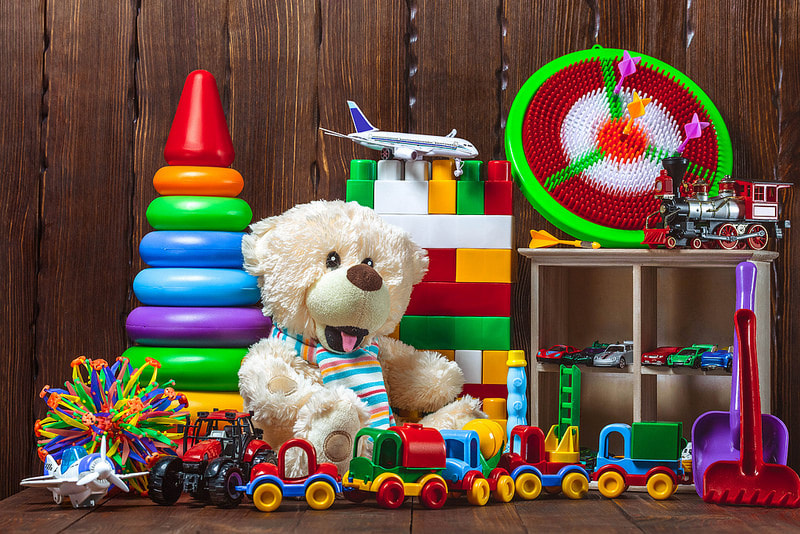It's not unusual for parents to feel overwhelmed by the demands their children may be making for all the latest in toys and gifts. The holiday season is a time of massive amounts of advertising, a great deal of it aimed at our children. Few parents are able or willing to say "yes" to all the toy requests their children may present, but if you approach it correctly, saying "no" doesn't have to make you feel like a Scrooge.
The holidays can make all of us feel like "kids" again. It's mostly a happy time, but also a season with heavy doses of marketing pressure. As adults we're able to control the impulses brought on by all those "buy stuff now!" ads, but our children face the same tidal wave of advertising without the experience to help temper the desires the ads create.
There are real reasons why the latest, heavily advertised toys can seem so appealing to our kids. It's a normal part of development for children to fantasize and jump from reality to a make-believe world with ease. Watch small children dressing up or acting out elaborate games and you can see how real those fantasy worlds can be for a child.
This ability to engage in fantasies is also why all the newest and "hottest" toys can seem so appealing. Children can easily dream about owning that exciting new game or toy, something they can imagine playing and sharing with friends, and maybe even be envied for owning.
These childhood dreams can be very strong during the gift-giving season, and when we have to let our kids down and say "no" to the latest requests it can leave us feeling like we're bad parents. This, however, may be an emotional reaction, but not a realistic evaluation.
As a parent there may be legitimate reasons why agreeing to a child's demands simply isn't practical, or desirable, or maybe even possible. While those reasons may make sense for you, for the child looking to fulfill his or her fantasy, your adult reality has little or no meaning.
Our normal parental response to a child's over-the-top request, or "demand," might be something like, "No, that toy is simply too expensive." Such a response often will lead to escalated tension that makes the child cling even harder to the fantasy of how wonderful it could be and how you just don't understand.
Instead, it often works better to allow the child to hold on to and enjoy the fantasy. Respond by showing you understand how wonderful and fun it might be to have that toy. Don't resist the fantasy, but give your child the time to return to reality at his or her own pace. Save the discussion of why the toy is not a good decision for a calmer time when the fantasy is not as strong.
Adapted from the American Counseling Association’s Counseling Corner Blog
The holidays can make all of us feel like "kids" again. It's mostly a happy time, but also a season with heavy doses of marketing pressure. As adults we're able to control the impulses brought on by all those "buy stuff now!" ads, but our children face the same tidal wave of advertising without the experience to help temper the desires the ads create.
There are real reasons why the latest, heavily advertised toys can seem so appealing to our kids. It's a normal part of development for children to fantasize and jump from reality to a make-believe world with ease. Watch small children dressing up or acting out elaborate games and you can see how real those fantasy worlds can be for a child.
This ability to engage in fantasies is also why all the newest and "hottest" toys can seem so appealing. Children can easily dream about owning that exciting new game or toy, something they can imagine playing and sharing with friends, and maybe even be envied for owning.
These childhood dreams can be very strong during the gift-giving season, and when we have to let our kids down and say "no" to the latest requests it can leave us feeling like we're bad parents. This, however, may be an emotional reaction, but not a realistic evaluation.
As a parent there may be legitimate reasons why agreeing to a child's demands simply isn't practical, or desirable, or maybe even possible. While those reasons may make sense for you, for the child looking to fulfill his or her fantasy, your adult reality has little or no meaning.
Our normal parental response to a child's over-the-top request, or "demand," might be something like, "No, that toy is simply too expensive." Such a response often will lead to escalated tension that makes the child cling even harder to the fantasy of how wonderful it could be and how you just don't understand.
Instead, it often works better to allow the child to hold on to and enjoy the fantasy. Respond by showing you understand how wonderful and fun it might be to have that toy. Don't resist the fantasy, but give your child the time to return to reality at his or her own pace. Save the discussion of why the toy is not a good decision for a calmer time when the fantasy is not as strong.
Adapted from the American Counseling Association’s Counseling Corner Blog





 RSS Feed
RSS Feed
